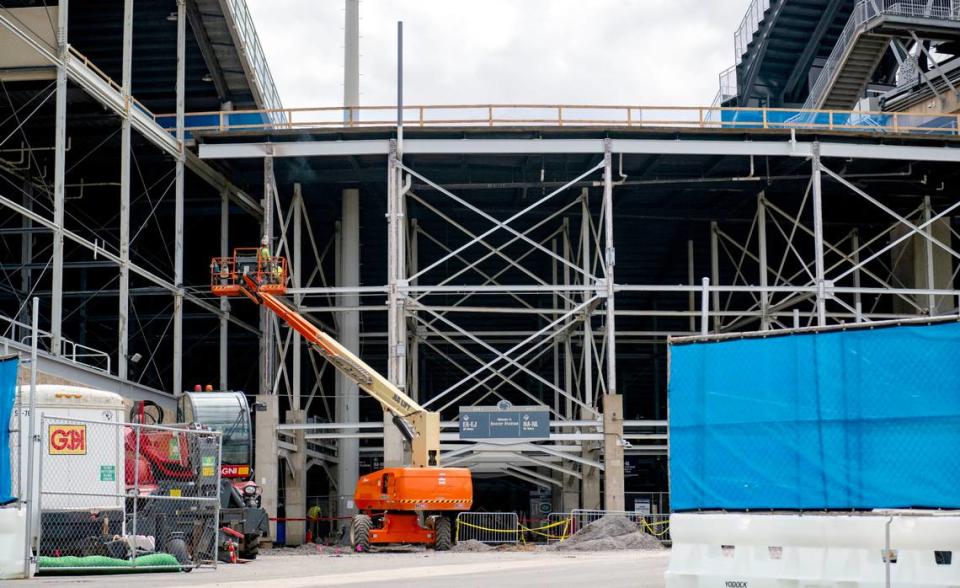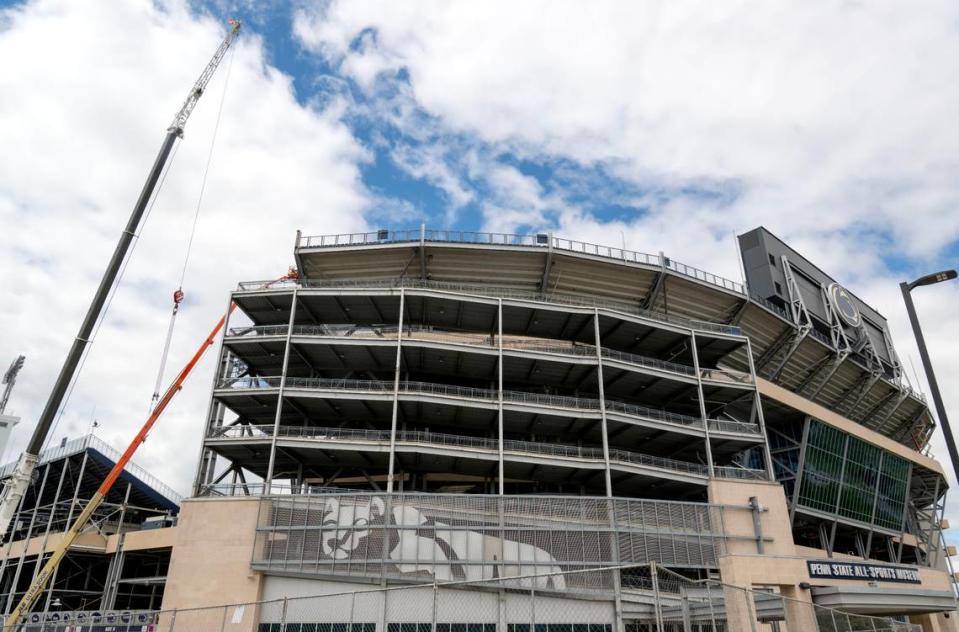Penn State’s board of trustees is set for a monumental vote on whether up to $700 million in proposed renovations to Beaver Stadium, the home of Nittany Lions football, will ultimately move forward — and one trustee has expressed skepticism the athletic department can afford it.
The university’s 36-voting-member board is scheduled to meet virtually at 10:30 a.m. Tuesday, and at least one trustee seems poised to vote no on the measure.
“As currently proposed, the $700 million Beaver Stadium renovation will be, by far, the largest capital expenditure in our athletics history and one of the largest (if not the largest) athletics capital projects in the history of college athletics,” alumni-elected trustee Barry Fenchak wrote Friday in a 1,200-word statement on his website. “I have researched this proposal at length and done the math. We can’t afford it.”
Neither the university nor athletic department responded in-depth Friday when asked if they wanted to address Fenchak’s written statement.
“Regarding the Beaver Stadium renovation, the board has had robust discussions on this topic and will continue them in public next week,” university spokesman Wyatt DuBois said.
It’s unknown for certain at this point whether Fenchak’s opinion reflects the thinking of a significant portion of the board of trustees. But in a board-wide vote last May, when it came to approving $70 million in renovations that included design costs for the larger $700 million makeover, Fenchak was the only trustee to vote against it.

When it comes to spending, the university’s board of trustees has rarely seen a majority vote against such measures. The alumni-elected trustees have sometimes voted against rising costs and capital projects — such as the art museum and tuition increases — but they comprise only nine seats on the board. When six alumni-elected trustees voted against spending $85 million toward the new Palmer Museum of Art, the measure still passed 26-7. Last year, five alumni-elected trustees voted against a tuition hike — but the increase still passed 25-5.
What are Fenchak’s concerns?
At the heart of Fenchaks’ argument is that Penn State’s athletic department cannot afford to take on more debt.
According to Fenchak, Intercollegiate Athletics already has $250 million of debt — and, if the Beaver Stadium renovations are approved, the debt would jump to $877 million, or 434% of annual revenue. The trustee said that would be the “highest in college sports history,” even greater than Cal, which can arguably trace its well-known financial struggles back to former AD Sandy Barbour.
Fenchak also implied Intercollegiate Athletics doesn’t have enough financial support of alumni, as it managed only $14.2 million in donations in 2022 compared to Ohio State’s $55 million and Alabama’s $115 million. And, based on projected operating expenses, Fenchak does not believe Intercollegiate Athletics would have the necessary revenue to support itself in the future.
Fenchak also expressed concern over the university’s “lack of transparency” on the renovations. He said he was “refused access to basic information” last year, and he publicly expressed concern in November that the renovations were essentially already a done deal.
“In January 2024 the $700 million project, which had still never been deliberated on nor voted on by the Board, was put out for bid,” Fenchak wrote. “Most parts of the contract have now been awarded and I repeat, this project has not been approved.”


Transparency
Many of the public details known about the proposed Beaver Stadium renovations came out around May 2023, at the same time the trustees elected to move forward with the smaller $70 million renovation that included winterizing the stadium so it could host a College Football Playoff game — in addition to stadium design costs, professional consultant expenses, acquisition of permits, etc.
In October 2023, Penn State announced its selections of an architect (Populous), construction managers (Barton Malow; AECOM Hunt; Alexander) and consultant (Nations Group). And, in December, Athletic Director Pat Kraft told reporters that the stadium design was about 30% completed. Few other details have since been publicly released.


The Centre Daily Times reached out Wednesday morning to spokespeople from both the university and the athletic department to clarify whether previously reported facts — such as the construction timeline projecting an August 2027 completion date — still held true. But a spokesperson responded and said they would not comment before Tuesday’s meeting.
They would not confirm whether the projected cost remained at up to $700 million, which Fenchak appeared to confirm Friday in his statement. They would not clarify what work has already been completed as part of the smaller $70 million renovations. They would not say whether the focus of the larger renovations has changed since last May when upgrades such as concession offerings, restrooms, Wi-Fi, premium seating, etc. were first mentioned. And they declined to answer whether the facility plans and/or the design plans for Beaver Stadium would be publicly released Tuesday.
They did acknowledge, however, that no tuition dollars — and none of the university’s state appropriation — would ultimately be used toward the renovations and would instead be paid for by the athletic department. But, as Fenchak also pointed out, the university would essentially take on the debt with the athletic department paying it all back.
What’s next
It’s unknown how long Tuesday morning’s trustees meeting might take, or what information might be publicly released.
Typically, more details can be gleaned from a “Supporting Materials” document located near the online agenda. But that link often does not become active until the meeting starts, or just before, meaning the public might not know more details about the renovations until after the project is approved or rejected.
The current agenda is far from detailed:
1. Call to order
2. Proposed Project Approval, Beaver Stadium Renovations, University Park
3. Adjourn
The meeting will be livestreamed at 10:30 a.m. Tuesday. It can be watched on trustees.psu.edu.
Source Agencies


